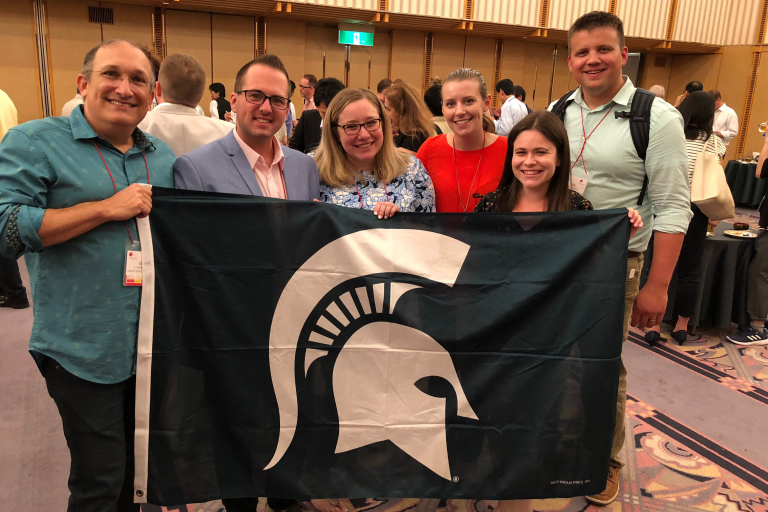In July, J. Scott Yaruss, a professor in the Department of Communicative Sciences and Disorders (CSD), and Soo-Eun Chang, an adjunct professor of CSD, accompanied five doctoral students to Hiroshima, Japan to present stuttering research at the first-ever Joint World Congress of the International Fluency Association (IFA), International Stuttering Association and International Cluttering Association.
MSU currently has one the largest cohorts of doctoral students studying stuttering in the United States, a testament to the university’s growing reputation in the field. It is the same reputation that has drawn clinicians and researchers like Yaruss into the fold.
“I came here because the department has made a commitment to studying stuttering,” said Yaruss. “We have this program making a significant commitment to two areas—stuttering and voice disorders—where clinicians feel the least well-educated, and what that does is give us an opportunity to become one of the top hubs to study stuttering.”
Researchers Abroad
The conference brought together the world’s three leading associations for the study of fluency disorders, including stuttering and cluttering. With five in attendance, MSU boasted the largest group of doctoral students from any institution present at the event.
Greg Spray and Erica Lescht were two of the students who presented research at the conference. Their work focused on applications for clinicians and speech-language pathologists to assess and treat children who stutter. Spray delivered a formal presentation of his work that aims to identify children who will persist in stuttering compared to those who won’t.
“Right now we don’t really have a way to differentiate children with persistent forms of stuttering, and while all these children may need treatment, I would like to be able to prioritize treatment so that we know the children who are going to have persistent stuttering are going to have more resources available,” said Spray.
The IFA conference was Lescht’s first time presenting research in an international arena. She delivered research conducted with CSD Professor Amanda Hampton Wray looking at the executive functions skills in children who stutter compared to those who don’t.
“It was a really great experience,” said Lescht. “I got to meet people from all over the world because there were a lot of great networking events and sessions. We got to interact with people, get feedback and think about our research in different ways.”
A High Reputation
Although she did not attend the event personally, Hampton Wray was enthusiastic about the possibilities the conference offered her doctoral students and MSU as a whole.
“We have a really big stuttering research focus here and I think it’s important for us to demonstrate that,” said Hampton Wray. “It helps the world see we’re doing lots of great, important research in lots of different areas related to stuttering, showing the breadth and depth of research being done at MSU. I think that’s been really exciting to have so many of our students, and such a strong MSU presence, at this First Joint World Congress on Fluency.”
To attend the conference, the doctoral students applied for and received travel grants from the National Institute of Health. All five who applied were awarded funds—an uncommon occurrence in the grant world.
“MSU is the place to be for stuttering,” said Yaruss. “We have a critical mass of students and resources so we can get our students to an international conference to present their research. If one is interested in stuttering, it’s an exciting place to be, and it’s really just the beginning.”
By Kristina Pierson
